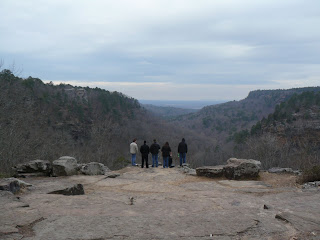>[Scroll down to read about the letters A-F in “A Sinner’s Lenten Alphabet.”]
Today I am still in Little Rock, enjoying the remains of a beautiful weekend with my best friend, Daphne, and her kids. Daphne, Hallie and I spent a lovely Saturday evening and Sunday morning at Petit Jean State Park, with its gorgeous mountain views and cozy lodge, complete with oatmeal for breakfast before making the winding drive back down to Little Rock on Sunday. This morning I went into my friend’s icon corner to pray while she was ![]() driving her boys to school, and I found myself face to face with an old friend—this small icon of the Mother of God, Tenderness, which was the 8th icon I wrote, back in 2003. (The number was on the back. The icon was blessed at St. John on Palm Sunday, 2004.) It was my first attempt at using a different method than I had been taught, and while the results were a little bumpy, Daphne and I both felt something special coming from our Lord’s Mother in this one. I realize it might sound vain for me to say something complimentary about an icon I painted, but icons are not secular pieces of art—they are holy images. They belong to the Church, or if they are venerated in a home, they belong to the faithful who pray before them. And on this particular morning, what I felt coming at me from this humble image was the Glory of God, in spite of the sinfulness of the iconographer.
driving her boys to school, and I found myself face to face with an old friend—this small icon of the Mother of God, Tenderness, which was the 8th icon I wrote, back in 2003. (The number was on the back. The icon was blessed at St. John on Palm Sunday, 2004.) It was my first attempt at using a different method than I had been taught, and while the results were a little bumpy, Daphne and I both felt something special coming from our Lord’s Mother in this one. I realize it might sound vain for me to say something complimentary about an icon I painted, but icons are not secular pieces of art—they are holy images. They belong to the Church, or if they are venerated in a home, they belong to the faithful who pray before them. And on this particular morning, what I felt coming at me from this humble image was the Glory of God, in spite of the sinfulness of the iconographer.
It was then that I realized that the
GLORY to GOD
For All Things
For if we do not have this hope set before us, how can we endure the suffering of this present age? As the Apostle Paul wrote:
“I consider that our present sufferings are not worth comparing with the glory that will be revealed to us.” (Romans 8:18)
I immediately thought about a blog I follow regularly, which is called, “Glory to God For All Things” and is written by Father Stephen Freeman in Oak Ridge, Tennessee. But also about a 
beautiful Akathist hymn by the same name, which was written by Father Gregory Petrov shortly before his death in a prison camp in 1940. The title is from the words of Saint John Chrysostom as he was dying in exile. It is a song of praise from amidst the most terrible sufferings. The first time I heard this akathist was at a women’s retreat in Jackson, Mississippi, in 1999. It was only a few months after the death of my precious 20-year-old Goddaughter, Mary Allison Callaway, who was a member of St. Peter Orthodox Church in Madison, Mississippi. Her priest, Father John Henderson, led the Akathist, and her mother was among the women who wept as we prayed this hymn together, including these verses:
“Glory to Thee, satisfying my desires with good things
Glory to Thee, watching over me day and night
Glory to Thee, curing affliction and emptiness with the healing flow of time
Glory to Thee, no loss is irreparable in Thee, Giver of eternal life to all
Glory to Thee, making immortal all that is lofty and good
Glory to Thee, promising us the longed-for meeting with our loved ones who have died
Glory to Thee, O God, from age to age.”
 As I prayed the rest of this akathist this morning, I heard the birds outside my friends’s home, and I remembered the awe I felt the previous morning as I looked out over the mountains at Petit Jean,(while Daphne was on a two-mile hike) towards the Arkansas River, and heard the birds soaring over the heights and watched the squirrels scampering about for their food before the day’s gathering storms:
As I prayed the rest of this akathist this morning, I heard the birds outside my friends’s home, and I remembered the awe I felt the previous morning as I looked out over the mountains at Petit Jean,(while Daphne was on a two-mile hike) towards the Arkansas River, and heard the birds soaring over the heights and watched the squirrels scampering about for their food before the day’s gathering storms:
“O Lord, how lovely it is to be Thy guest. Breeze full of scents; mountains reaching to the skies; waters like boundless mirrors, reflecting the sun’s golden rays and the scudding clouds. All nature murmurs mysteriously, breathing the depth of tenderness. Birds and beasts of the forest bear the imprint of Thy love. Blessed art thou, mother earth, in thy fleeting loveliness, which wakens our yearning for happiness that will last for ever, in the land where, amid beauty that grows not old, the cry rings out: Alleluia!”
It’s hard to believe that Father Petrov wrote these words from a prison camp, where he would ultimately meet his death. And yet even there, he saw God’s Glory, and wrote, “how lovely it is to be Thy guest.”
Imagine how it might transform our lives if we could learn to see God’s Glory in everything. May God open the eyes of our hearts during this springtime of his Fast, that we may also sing, “Glory to God for all things!”

2 thoughts on “>G is for GLORY to GOD For All Things”
Comments are closed.